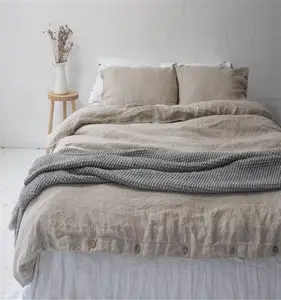Polyester microfiber comforters are known for their hypoallergenic properties, making them a popular choice for individuals with allergies or sensitivities. Here’s a detailed look at the hypoallergenic characteristics and benefits of polyester microfiber comforters:
Key Hypoallergenic Properties
Resistance to Allergens:
Dust Mite Resistance: Polyester microfiber is tightly woven, which helps prevent dust mites from penetrating and living in the fabric. Dust mites are a common cause of allergies and can thrive in bedding made from materials that trap moisture and provide a suitable habitat.
Mold and Mildew Resistance: Polyester microfiber has low moisture absorption, which reduces the risk of mold and mildew growth. Mold spores are allergens that can exacerbate respiratory issues and allergies.
Inhibits Bacterial Growth:
Antimicrobial Properties: Many polyester microfiber comforters are treated with antimicrobial finishes that inhibit the growth of bacteria and fungi. This helps in maintaining a cleaner and healthier sleeping environment.
Non-Absorbent:
Low Moisture Retention: Polyester microfiber does not absorb moisture easily, which helps in keeping the bedding dry and less conducive to the growth of allergens like mold and mildew.
Quick-Drying: The fabric dries quickly, further reducing the potential for allergen buildup associated with damp conditions.
Smooth Surface:
Tight Weave: The dense weave of microfiber creates a smooth surface that is less likely to trap dust, pet dander, and other common allergens.
Non-Porous: The non-porous nature of polyester microfiber makes it difficult for allergens to penetrate and settle into the fabric.
Synthetic Composition:
Allergy to Natural Fibers: Unlike natural fibers such as wool or down, which can sometimes cause allergic reactions, polyester microfiber is a synthetic material that is less likely to trigger allergies.
Ease of Cleaning:
Machine Washable: Polyester microfiber comforters are easy to wash and dry, allowing for regular cleaning to remove allergens. Frequent washing helps maintain a hypoallergenic environment by eliminating dust, pet dander, and other potential irritants.
Durability in Cleaning: The material can withstand frequent washing without losing its shape or performance, which is important for maintaining a hypoallergenic bedding solution.

Additional Considerations
Hypoallergenic Certification: Some polyester microfiber comforters come with certifications such as OEKO-TEX Standard 100, indicating they have been tested for harmful substances and are safe for individuals with sensitive skin and allergies.
Antiallergic Treatments: Manufacturers may apply additional treatments or coatings to enhance the hypoallergenic properties of polyester microfiber comforters. These treatments can provide added protection against common allergens.
Practical Benefits for Allergy Sufferers
Improved Sleep Quality: The hypoallergenic properties of polyester microfiber comforters help create a more comfortable and allergen-free sleeping environment, contributing to better sleep quality for allergy sufferers.
Reduced Allergy Symptoms: Using hypoallergenic bedding like polyester microfiber comforters can reduce symptoms such as sneezing, coughing, and congestion, particularly for individuals allergic to dust mites or other common allergens.
Maintenance of Hygiene: The ease of cleaning and antimicrobial properties of polyester microfiber comforters help maintain a hygienic sleeping environment, which is crucial for individuals prone to allergies and respiratory issues.
Polyester microfiber comforters offer a range of hypoallergenic benefits, including resistance to dust mites, mold, and bacteria, low moisture retention, and ease of cleaning. These properties make them an excellent choice for individuals seeking a comfortable and allergy-friendly bedding option. By providing a barrier against common allergens and maintaining a clean and dry environment, polyester microfiber comforters contribute to improved sleep quality and overall health for allergy sufferers.















.jpg?imageView2/2/format/jp2)
.jpg?imageView2/2/format/jp2)
.jpg?imageView2/2/format/jp2)
.jpg?imageView2/2/format/jp2)
.jpg?imageView2/2/format/jp2)
.jpg?imageView2/2/format/jp2)
.jpg?imageView2/2/format/jp2)

.jpg?imageView2/2/format/jp2)